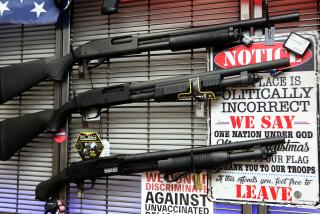The Fight Against Crime: Notes From the Front : No Wonder Gun Control Is a Problem
- Share via
Allen Sheldon of Northridge is a patient, law-abiding man, an honest man--a man who even in confounding times stubbornly tries to do the right thing.
He is also the owner of four guns: a pistol, a shotgun and two rifles--target shooting firearms he bought about 20 years ago but hasn’t fired in years.
So with all the recent talk about gun deaths and gun-control regulations, Sheldon wanted to know if he was legally required to register these weapons and if so, how.
Simple question, right?
Well, no. This then, is the story of his quest for an answer.
“I said, ‘What the hell, I’ll call and see what the requirement is,’ ” said Sheldon, a business systems consultant. First call was to the LAPD’s Devonshire Station, a few blocks away.
“The sergeant didn’t know the answer, so he transferred me back to one of the detectives,” Sheldon said. “The detective told me to take the pistol, unload it, put it in my trunk and drive to the station. He said someone would take care of it.”
But “I couldn’t do it that day because he was the only one there and was about to go home himself.”
But when he tried again with another detective later, “she said, ‘Oh, no. We don’t do that. That’s an old procedure we haven’t done in years. You have to go to a gun shop.’ ”
Pressing on, Sheldon called Sherwood International Export Corp., because it had the biggest gun shop ad in the Yellow Pages. “We don’t know anything about that,” an employee told him.
Back to the police. “I thought the detective at Devonshire had been confused, so this time I called the Van Nuys Station,” he said. New station, same story: “Call a gun shop.”
All that got him was half a dozen gun shop employees who told him things like: “We don’t know what it is, and we don’t do it.” One told him--correctly--that there is no requirement to register his firearms, but by this time, Sheldon was in no mood to believe anyone.
With what he describes as a “sense of building frustration,” Sheldon asked the Los Angeles city attorney’s office, which referred him to the district attorney’s office, where an investigator “told me he was unaware of the requirements.”
“I was dumbfounded that there seemed to be no structure,” he said. “They license your car, they license your dog. I didn’t understand. I guess the credit must go to the NRA for stopping any attempt to register guns.”
Finally, he called The Times. And according to the state Department of Justice, this is his answer:
Those who own handguns legally acquired in any way before 1991 are not required to register them. Handgun purchases from gun shops for some years before that were recorded in Sacramento, but sales between private parties were not.
Since 1991, however, handgun sales between private citizens must be brokered by a registered gun dealer, who sends the paperwork to Sacramento just as if it were a new gun being purchased from a shop.
The department checks to see if the purchaser has a criminal history, is under a judicial restraining order or has been declared mentally ill. If not, purchasers can take delivery in 15 days.
That paperwork is retained in a computer, forming a partial record of handgun ownership that apparently bolsters a widespread misimpression that handguns must be “registered” in California. In actuality, there is only the purchase-approval process with many exceptions--such as all private party sales before 1991, guns brought in from other states by new residents, and inherited guns bought before purchase conditions were initially imposed on new handgun sales in the 1940s.
And in the case of shotguns and rifles, even the new purchase paperwork is destroyed after the 15-day clearance period.
Sheldon hopes that at least the story of his fruitless search “helps some other people who are sitting around with a gun, wondering what to do with it.”
In short: nothing. Registering a legally owned gun is sort of like asking for a goldfish license--in the end, there is no machinery to administer a nonexistent requirement.
More to Read
Sign up for Essential California
The most important California stories and recommendations in your inbox every morning.
You may occasionally receive promotional content from the Los Angeles Times.









